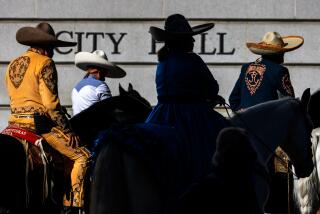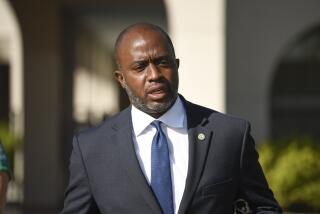Viewers Oppose Proposal for ‘Adult’ Cable Television Fare
Like Supreme Court Justice Potter Stewart, who knew obscenity when he saw it, Mayor Terry L. Dipple says he recognizes the danger of sexually explicit movies and does not want to see them on local cable television.
Arguing that “adult” programming would offend the community, Dipple and other San Dimas residents have come out in opposition to plans by Foothills Cablevision to begin offering adult fare.
The company, which also provides service to Arcadia, Bradbury, Glendora, Monrovia, Sierra Madre and Rialto, plans to offer the sexually explicit Tuxedo Channel to all its subscribers on a pay-per-view basis starting May 1.
Unlike basic cable service, subscribers would phone in their request for a one-time showing of a Tuxedo feature on a special channel. Company representatives say San Dimas is the only city whose officials have raised objections to the service.
The City Council has set a Tuesday hearing to discuss its strategy in opposing the change and to hear from company officials, who did not address a council hearing on the issue last week. They asked for more time to prepare their presentation.
“The shows, in my opinion, are not in keeping with the community standards,” Dipple said. “I personally don’t think it’s acceptable to be on the television for anyone who wants to watch.
“X-rated movies are allowed in theaters, but having them piped into your home is something else.”
Tom Schaeffer, the company’s vice president, said Tuxedo is similar to Playboy magazine’s cable program and shows sexually explicit movies that are rated as “a hard R, not an X” during the evening.
Cablevision wants to expand its service to meet a market demand, but “if an individual subscriber doesn’t want it in the house, we have the capability of scrambling that channel,” Schaeffer said.
“Our goal is to provide a wide variety of programming to our subscribers and let them make the choice,” he said. “It’s not something we are forcing on anyone.”
San Dimas is investigating whether its cable franchise ordinance allows it to regulate the programs shown by the company. Officials acknowledge that their efforts may conflict with federal law deregulating the cable industry and First Amendment guarantees of free speech.
Under the ordinance, the city has the right to review new or substitute programming to ensure that the changes do not detract from the overall quality of service. The city may ask for alternative programming if it is dissatisfied with the changes, according to Gaby Pryor, assistant city manager.
“The question is whether Cablevision has to abide by that,” she added.
The city is expecting a ruling on the law from City Atty. J. Kenneth Brown, who was unavailable for comment.
Dipple said deregulation of the cable industry under the Reagan Administration might have weakened some local government authority over operators, but added: “It’s my opinion that we still have control over the quality of Cablevision.”
The National Cable Television Assn., an industry lobby group, said the Constitution bars local government from prohibiting sexually explicit programming that is not defined as obscene and, as such, illegal.
“This programming is not obscene or it would not be allowed in the first place,” said Lynn C. McReynolds, association spokeswoman. “Anytime someone has set up a statute, it has been struck down as a violation of the First Amendment.”
In past rulings, Supreme Court justices have held that material is obscene when it appeals primarily to prurient interest, is patently offensive and is entirely lacking in artistic, literary or social value.
In March, 1987, the court ruled that states may not regulate sexually explicit cable programs that are not considered legally obscene. The ruling overturned a Utah law that banned the broadcast of “indecent” material depicting nudity or sexual activity.
Besides Dipple, other council members opposed to the Tuxedo Channel have said they will try to persuade Cablevision not to provide the programming. Councilman Sandy McHenry said that if Cablevision does not cancel its plans for Tuxedo, residents should begin a boycott.
“I think there’s foment in the community against the cable company bringing this thing in,” he said. “But there’s also a strong feeling against the city taking the role of censor.”
In hopes of heading off a confrontation, Schaeffer said the company wants to meet with city officials and residents to present its reasons for adding Tuxedo.
But Dipple said: “If the talking is that they want to put the adult channel on Cablevision, then the talking is done.”
He said he is not satisfied with the company’s offer to permanently block access to the channel for households that request it because cable customers must contact the company for the special arrangement.
Dipple, who has four children, said he is concerned about the availability of the programming to youngsters, who might order the service while adults are away.
“I’m no prude, but I’m very concerned about what they’re exposed to,” he said.
More to Read
Sign up for Essential California
The most important California stories and recommendations in your inbox every morning.
You may occasionally receive promotional content from the Los Angeles Times.










